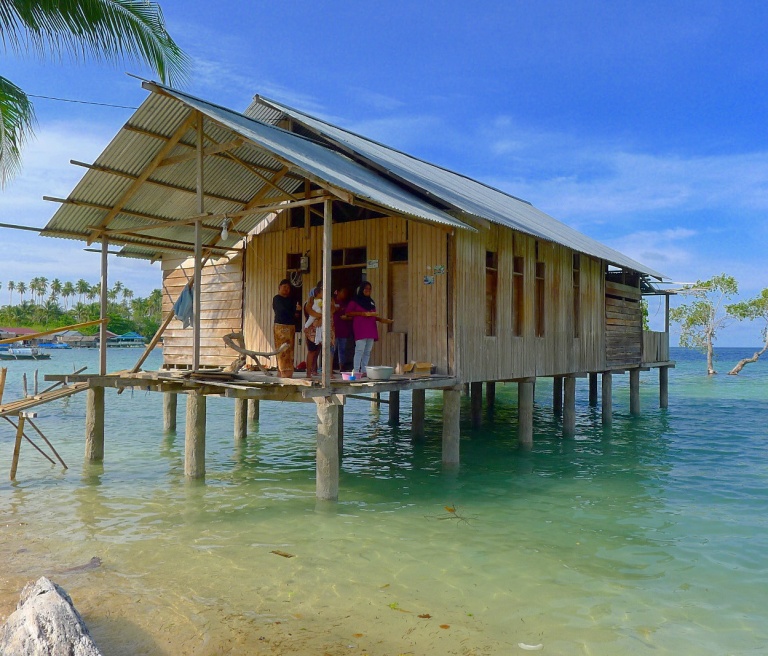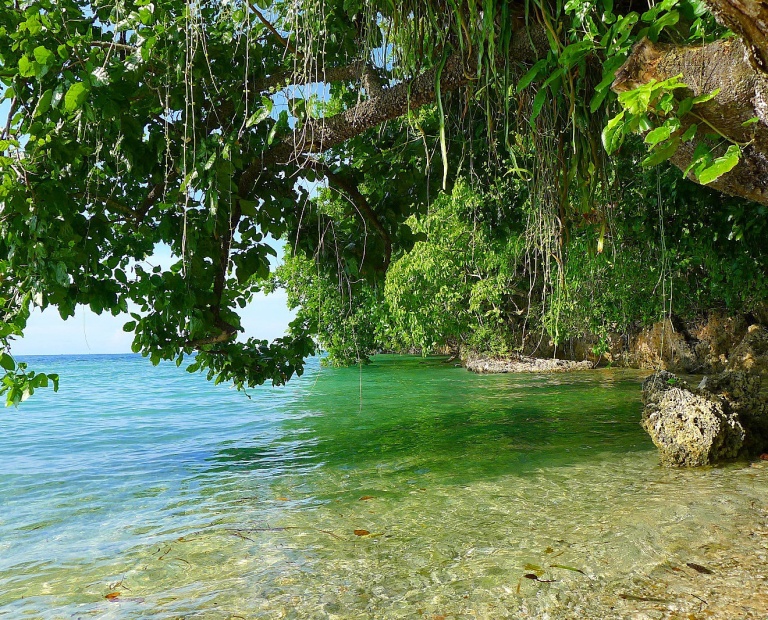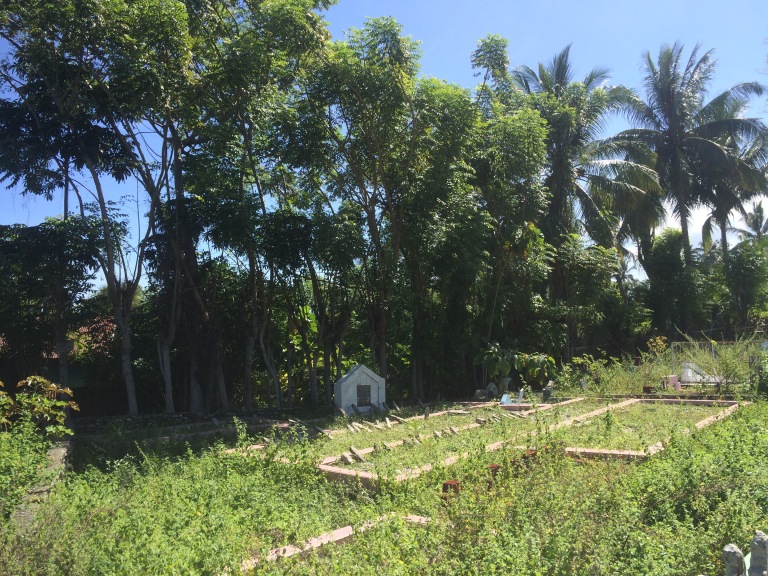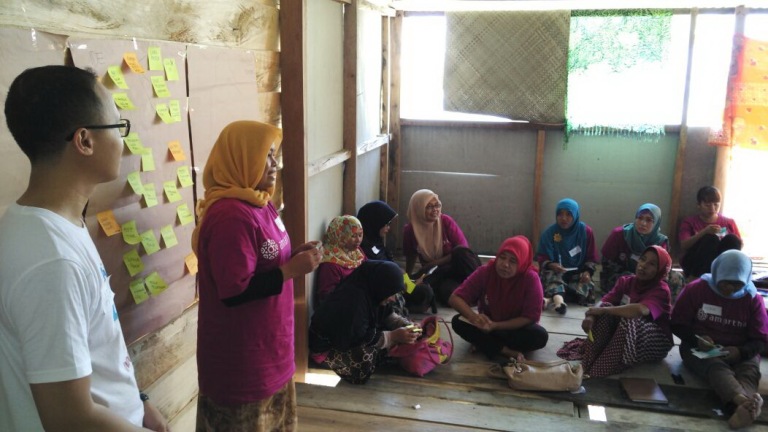
The rain poured heavily one minute after we arrived in the village. Almost midnight. Kalamalea, a fishing village in Northern Poso, was asleep in a stunning silence. There was no opposing sounds against the burst of the water hitting the metal roof of the house where we were staying.
After 15 hour trip, it looks like a perfect night to knock yourself off till the next afternoon or so. But to me, it was not.
Right before entering the village through a nearly ripped off narrow asphalt road–partly covered with ivies and bushes, we passed through a mass grave of unidentified massacre victims during the conflict between 1998-2005. Thousands of people were killed in vain by a pseudo reason of holy wars which in fact a cheapskate to someone’s political ladder. A thought that bothered my mind and kept me awake till almost dawn.
When the daylight finally broke into my quarter, I was a kid in a candy store to learn that the backdoor of the house leads to an open ocean, the bay of Poso. A dope to compensate severe sleep deficiency the night before.
To my surprise, the rainstorm last night insistently cleared up the sky. The bluest morning as I recall it, with only sheer white foggy cloud blanketing the horizon. My first day in Kalamalea village seems to be a bright day.
Being a fishing village, most Kalamalean men earn their living as traditional fisherman. At night, they set sail to the ocean with a wooden boat, balanced with bamboo “cadik” on each sides to surf the rough waves without fear of flipping over. Some of them are descendant of Bajo tribe, the legendary sailor from South Sulawesi. The tale of Bajo sailor has been part of Indonesia’s renowned maritime history. “Not a single life of Bajo men were claimed at sea”, old man says, citing how legendary their sailing skills are.
While their men are at sea, the women of Kalamalea spend most of their time cultivating farms and planting veggies and flowers. Nothing much they can do to earn extra income as their skills and knowledge have been limited and never been extensively explored, as a result of the prolonged conflict and uncertainties.
Its geographical isolation, in fact, has complemented the lack of valuable commodities from the area to support their economy. Therefore, until today many of Kalamalean live under the poverty line.
“Selamat pagi… selamat datang di Kalamalea” some women villagers greeted me while I was struggling to step up the ladder towards the community house where we were about to congregate. I see genuine friendship and friendliness in their smiling faces. I nearly forget that behind their smiles, there were pain and trauma of bloody conflicts, not too long ago. The conflict that took the lives of their husbands, sons, sisters, parents, their loved ones, just merely because they spell gods in different names. Really? I feel crushed.
I moved to an open veranda at the back of the house, overlooking the open sea. Cone roots of the mangrove appeared to pop up from the seabed as the water subsided that early morning. The house itself looks a bit rundown and abandoned. There were some holes on the deck, as parts of the wooden floor had fallen off aging. While it’s time to commence the conversation with the villagers, I felt like I was just not ready yet.
A cup of hot tea finally brought my wandering mind back to the house. Followed by “nasi bungkus” breakfast of mouthwatering spicy steamed fish made by our host. Even the first hour of my stay has been so far overwhelming.
And that’s how the day went. When I moderated discussions about building the economy of their community, every single one of the attendees paid their full attention. Privilege that I rarely enjoy when teaching at a top tier university classes. But, here we are. A coastal village of Kalamalea, only fifteen painful hours from the glittering capital of Jakarta.
When the sun inclined to the West, we moved into a more casual conversation; about their activities at home, children and some of their businesses. One thing I admire most from these women would probably their positive attitude towards the future. Not even one person within the group ever complaining about their poverty, their loss of the loved ones during the conflict, or even simply their extra efforts to attend today’s session. Nothing. I could only see smiles, optimism and bravery. Even one person did an extreme move by traveling 230km on a motorbike taxi (Ojek) and paid IDR 300k (USD25) to get to this place, ontime!
To them, I might also be one of the few crazy people who dare to cross the line of Jakarta’s convenience and knocked their doors to have this kind of conversations today. This way, we build our connections.
On the second night in Kalamalea, I had better hours of sleep. And that was when I had a visitor in my dream. A young lady smiled at me, without a single word spoken. I just knew that she was someone from the area. Her face looked so bright, and I was stunned for a couple of seconds. It was a sheer border between my dream and reality, until I was awakened completely at 3:13 am. It was when I decided to walked outside and looked up to the sky when millions of millions of stars powdering the darkest skies. I can’t barely remember when was the last time I had a chance to do stargazing. It’s been years before that night.
While skies are the place for the past, let the painful history of Poso be ascended to the sky. So they can mingle with the stars and be immortalize by the universe. As for us today, let the smiles of Kalamalean rejoice the future. Nurturing generation that embraces hope and optimism to build a nation where everyone can call home.





Thanks for writing this post, Aria. I believe many of us need to be reminded of the bloody conflicts that once engulfed this corner of Indonesia, as well as other places like Maluku. Too often politicians abuse religions to exploit people’s naiveté.
An honor for me to have a chance connecting with this awesome people, and be part of their dreams in seizing brighter future.
They do deserve brighter future.